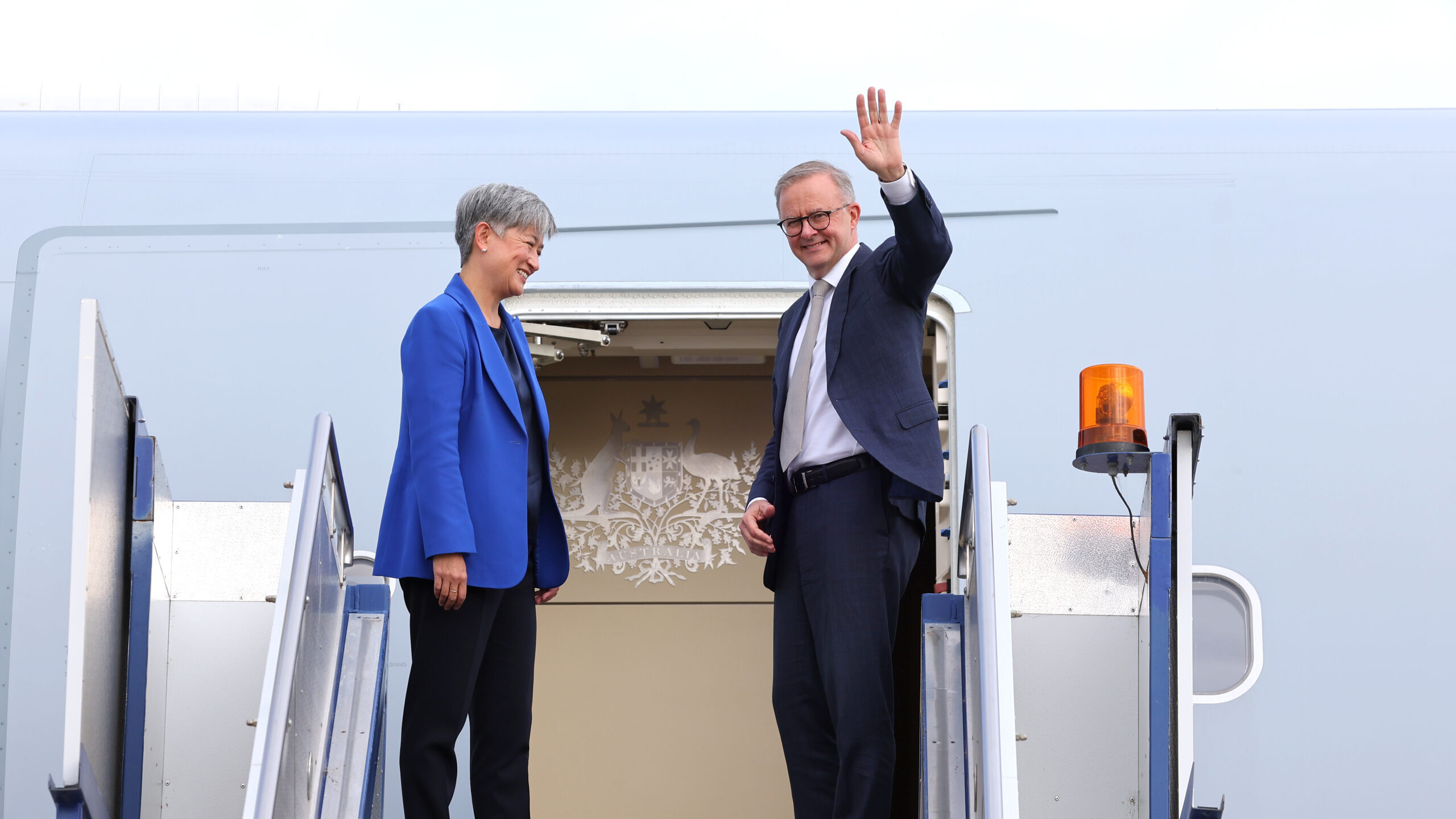
Prime Minister Anthony Albanese stands with newly appointed Foreign Minister Penny Wong, at the door of their plane on May 23, 2022 in Canberra, Australia. (Photo by David Gray/Getty Images)
SHANGRI-LA DIALOGUE — In a speech aimed straight at the heart of the toughest issues in the Indo-Pacific, Prime Minister Albanese of Australia called for “partners, not competitors” in the region, and said conflict there is not a “foregone conclusion.”
In a well-crafted keynote dinner speech at the beginning of the Shangri-La Dialogue, Anthony Albanese issued a clarion call for China to resume military and diplomatic talks with the United States: “Australia strongly supports renewed efforts from President [Joe] Biden’s administration to establish reliable and open channels of communication between the governments of the United States of America and the People’s Republic of China.”
The US has repeatedly warned over the past months that senior Chinese military officials are simply refusing to pick up the phone when their American counterparts call, sparking fears of miscommunication and escalation in the event of any incident. China’s defense minister also refused a meeting with US Secretary of Defense Lloyd Austin at this conference.
But soon after Albanese finished his speech, Pentagon spokesman Brig. Gen. Patrick Ryder issued a statement saying: “Secretary Austin and PRC Minister of National Defense Li Shangfu spoke briefly at tonight’s opening dinner of the Shangri-La Dialogue in Singapore. The two leaders shook hands, but did not have a substantive exchange. The Department believes in maintaining open lines of military-to-military communication with the PRC — and will continue to seek meaningful military-to-military discussions at multiple levels to responsibly manage the relationship.”
The handshake. Defense Secretary Austin walks over to Chinese Defense Minister Li Shangfu to say hello at the #SLD23 in Singapore. Li had turned down the U.S. proposal for a meeting. pic.twitter.com/t9KkUI3vSw
— Yaroslav Trofimov (@yarotrof) June 2, 2023
Albanese, who may well have known about the contact as he attended the dinner, said his government “has put dialogue at the heart of our efforts to stabilize our relationship with China. We’re not naïve about this process, or its limitations.
“We recognize there are fundamental differences in our two nations’ systems of government, our values and our worldviews,” he said. “But we begin from the principle that whatever the issue, whether we agree or disagree, it is always better and more effective if we deal direct.”
American sources have told Breaking Defense that Australia is using diplomatic back channels, and plain old direct communication by its diplomats, to tell China what they expect, why they expect it and what both sides may gain from it. Australia is, of course, one of America’s closest allies, so its representations may carry additional weight when made.
Perhaps in line with that role, Albanese included sharp criticism of China’s belligerent and illegal actions in a wider swath of the Indo-Pacific region. He pointed to Australia’s planned purchase of nuclear attack submarines under the AUKUS agreement as the country’s commitment to the rules-based international order.
“In boosting our nation’s defense capability, Australia’s goal is not to prepare for war but to prevent it — through deterrence and reassurance and building resilience in the region. Doing our part to fulfill the shared responsibility all of us have to preserve peace and security, and making it crystal clear that when it comes to any unilateral attempt to change the status quo by force: be it in Taiwan, the South China Sea, the East China Sea or elsewhere, the risk of conflict will always far outweigh any potential reward,” he said. (Although it’s a signatory of the UN Law of the Sea agreement, China has unilaterally rejected the findings of a UN tribunal that it has no historic or other claims to vast portions of the South China Sea.)
Albanese, while praising the great benefits China’s economic growth has brought to the region, noted that countries must work together and respect each other’s sovereignty.
“Upholding sovereignty, not just for the biggest powers, or the loudest voices — but for every nation. Sovereignty that confers on every nation the right to determine its own destiny,” he said. “To pursue opportunities for our people without fear of coercion or retribution. To have confidence in the integrity of our borders — including our maritime zones — and control of our own resources.
“Because just as the prosperity of our region has always been driven by shared opportunity – the stability of our region can only be secured through collective responsibility,” he said.
He also dismissed the characterization of the region “as a potential “theater” for conflict. As if this is merely a backdrop, a location, an arena for the ambitions of others.
“Such a view is entirely — and dangerously — wrong. Not only does such a characterization dismiss the agency and ambition of a majority of the world’s population, and the engine room of the global economy, it also presents the future of this region as somehow a foregone conclusion.”
He pointed to the end of the Cold War, with the talk of the “end of history” and the glib assumption that globalization would spread bounty throughout the world.
“The fate of our region is not pre-ordained,” he said. “It never was. It never is. What we do here, what we decide here, matters – for us and the world. It always will.”
Peace “has to be built, pursued, defended and upheld.” So Australia is engaged in a whole of government effort “that enables economic competition and guards against strategic conflict.
The goal? “A region and a world where two countries can disagree — even very firmly — without that disagreement ending in disaster.”








